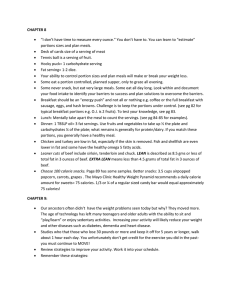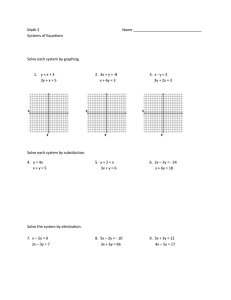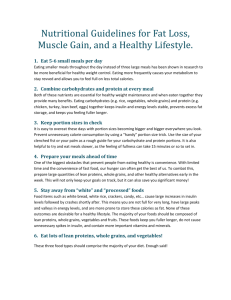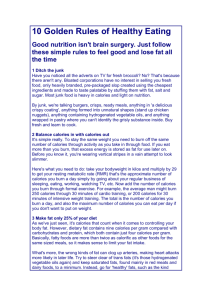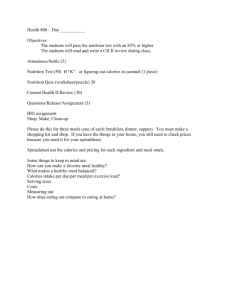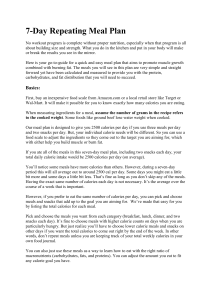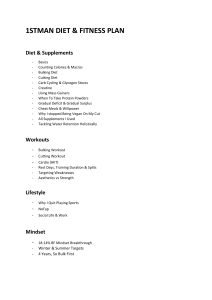Keys to Success Educate yourself about how your body works
advertisement
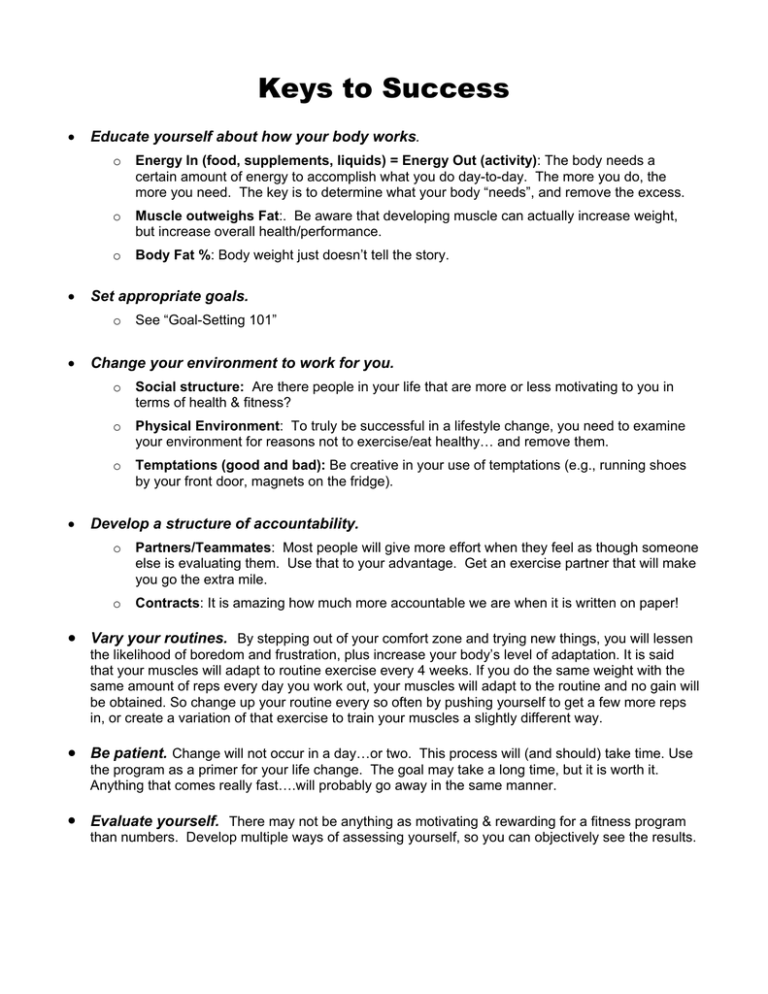
Keys to Success • • Educate yourself about how your body works. o Energy In (food, supplements, liquids) = Energy Out (activity): The body needs a certain amount of energy to accomplish what you do day-to-day. The more you do, the more you need. The key is to determine what your body “needs”, and remove the excess. o Muscle outweighs Fat:. Be aware that developing muscle can actually increase weight, but increase overall health/performance. o Body Fat %: Body weight just doesn’t tell the story. Set appropriate goals. o • • See “Goal-Setting 101” Change your environment to work for you. o Social structure: Are there people in your life that are more or less motivating to you in terms of health & fitness? o Physical Environment: To truly be successful in a lifestyle change, you need to examine your environment for reasons not to exercise/eat healthy… and remove them. o Temptations (good and bad): Be creative in your use of temptations (e.g., running shoes by your front door, magnets on the fridge). Develop a structure of accountability. o Partners/Teammates: Most people will give more effort when they feel as though someone else is evaluating them. Use that to your advantage. Get an exercise partner that will make you go the extra mile. o Contracts: It is amazing how much more accountable we are when it is written on paper! • Vary your routines. By stepping out of your comfort zone and trying new things, you will lessen the likelihood of boredom and frustration, plus increase your body’s level of adaptation. It is said that your muscles will adapt to routine exercise every 4 weeks. If you do the same weight with the same amount of reps every day you work out, your muscles will adapt to the routine and no gain will be obtained. So change up your routine every so often by pushing yourself to get a few more reps in, or create a variation of that exercise to train your muscles a slightly different way. • Be patient. Change will not occur in a day…or two. This process will (and should) take time. Use the program as a primer for your life change. The goal may take a long time, but it is worth it. Anything that comes really fast….will probably go away in the same manner. • Evaluate yourself. There may not be anything as motivating & rewarding for a fitness program than numbers. Develop multiple ways of assessing yourself, so you can objectively see the results. Weight Management o Balance carbohydrates, fats, and proteins using the food pyramid as a guideline. o Consume whole grains for carbohydrates • Enriched wheat or wheat is not considered whole grain. • Read the label. o Limit unsaturated fats to less than 1%. o Consume primarily legumes, chicken, and fish with occasional beef or pork. o Consume variety of fruits and vegetables. o Consume within the estimated energy requirements specified specifically for you. o Try grazing (small portions)---consuming meals and snacks at no more than 500-700 calories. Use a small salad plate at meals to help control meals. o Time your meals appropriately • Eat a healthy breakfast-it will increase metabolism up which means you burn more calories. • Don’t eat a late meal (eat a light snack)-most people tend to be less active in the evenings and the calories will essentially be stored as fat. • Eat one of your meals after a workout-the calories get used up. o Desserts/Snacks-create a list of snack that appeal to you that are limited in sugar and saturated fat. Find snacks that are easy to grab for those sudden instances. o Meals-Keep a list of healthy meals to refer back to. o Plan around holidays or special events to allow yourself the occasional un-nutritious meal. One meal a week, allow yourself to splurge a little. Physical Fitness • Weight Training o o o o o • Cardiovascular Exercise o o o o o o • 2-3 days a week. 20-30 minutes per workout. Should be balanced with free weights and machines (see your trainer). Should be a full body routine. 1 set of 15 reps 3-5 days a week. 20-60 minutes The longer you exercise-the more calories you burn to manage weight. Stay within your working heart rate (see your trainer). Select a variety of cardio exercises. Set daily and weekly goals for cardio in addition to your long term goal. Recreational Activity o o Stay active on weekends and do different things. Involve your family. • Find a partner to exercise with you and hold you accountable. • Include your family to exercise with you.
